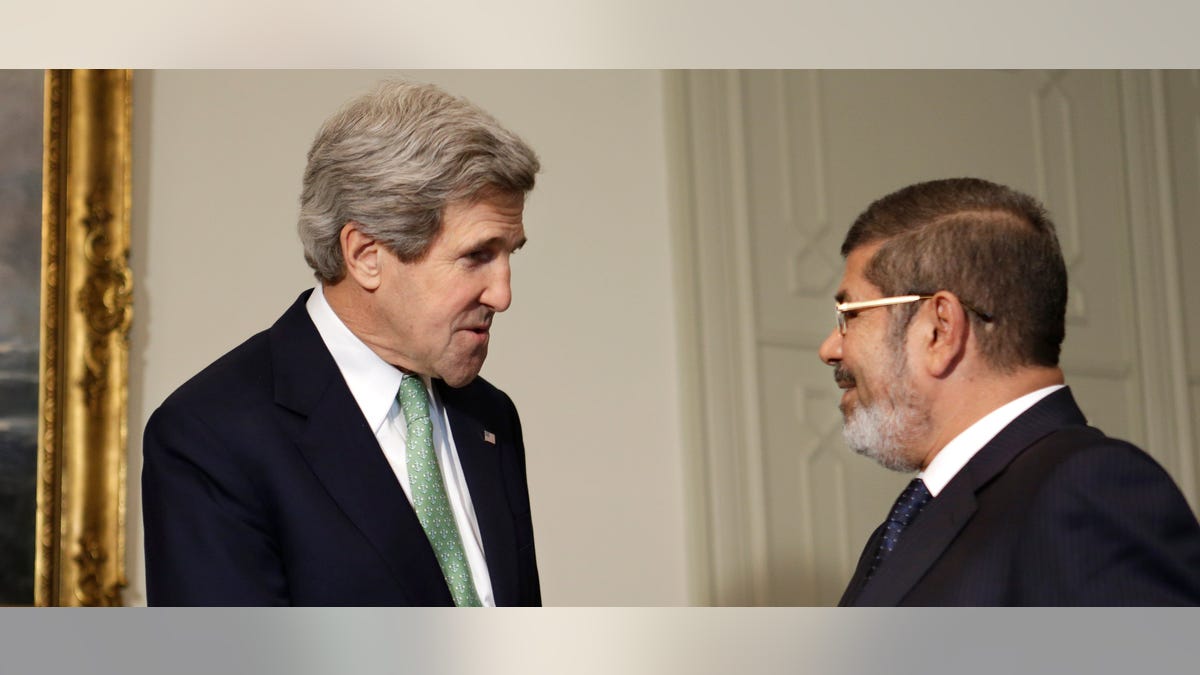
FILE: March 3, 2013: Secretary of State John Kerry, left, shakes hands with Egyptian President Mohamed Morsi at the Presidential Palace in Cairo, Egypt. (AP)
The Obama administration is facing criticism for giving $250 million in aid to Egypt while saying the recent sequester has forced drastic cutbacks elsewhere in the budget -- including forcing the release of "low-priority" illegal immigrants from jail.
The aid announcement was made Sunday by Secretary of State John Kerry after a meeting with Egyptian President Mohamed Morsi.
Though Kerry cited Egypt's "extreme needs," as it tries to strengthen its burgeoning democracy, critics suggested that kind of money could offset some of the $85 billion in automatic cuts this year, which kicked in Friday and are known collectively as the sequester.
"With sequestration forcing our nation to face billions of dollars in cuts across the government, it is unfathomable that the administration would send funds unconditionally to the Muslim Brotherhood-led government," Republican Rep. Ileana Ros-Lehtinen, former chairwoman of the House Committee on Foreign Affairs, told FoxNews.com on Tuesday.
Under the rules of sequestration, the cuts are across the board, which means government leaders have little flexibility in shifting money within programs or departments, including the Pentagon. Some in Congress have floated the idea of giving the administration that flexibility, but nothing has passed so far. Further, the money for foreign aid is originally appropriated by Congress.
Still, it's all taxpayer money. The $250 million amount -- which in this case includes $190 million from a total of $450 million earmarked for Egypt -- theoretically could go a long way toward defraying other sequester cuts.
Before Kerry made the announcement, the Department of Homeland Security, citing the looming budget cuts, began releasing hundreds of immigrants facing deportation. Some reports say the number is already in the thousands.
Homeland Security Secretary Janet Napolitano on Monday confirmed the releases. She said the illegal immigrants were released on bail and that the administration would "manage its way" through the cuts by putting the lowest-risk detainees into "some kind of alternative to release."
It's unclear how much money DHS claims to be saving by releasing the detainees.
But in taking a look through other federal sequester cuts, here's what else $250 million could restore:
- U.S. Marshals Service, salaries and expenses: $59 million
- Food Safety and Inspection Service: $53 million
- FEMA, salaries and expenses: $52 million
- Federal Air Marshals: $49 million
- Border Security Fencing, Infrastructure, and Technology (for Customs and Border Protection): $20 million
- September 11th Victim Compensation (general fund): $16 million
- Defense Nuclear Waste Disposal: $1 million
Here's what $450 million could restore:
- U.S. Secret Service: $84 million
- Marshals Service, salaries and expenses: $59 million
- Animal and Plant Health Inspection Service: $56 million
- Food Safety and Inspection Service: $53 million
- FEMA, salaries and expenses: $52 million
- Federal Air Marshals: $49 million
- Court Security: $25 million
- Army, family housing construction: $24 million
- Border Security Fencing, Infrastructure, and Technology (for Customs and Border Protection): $20 million
- September 11th Victim Compensation (general fund): $16 million
- CDC, World Trade Center Health Program Fund: $10 million
- FEMA, Radiological Emergency Preparedness Program: $2 million
Ros-Lehtinen has been critical of the Morsi regime since shortly after it came into power last year on the heels of the Arab Spring overthrow of Hosni Mubarak. She affirmed her position this week.
"It's an unstable regime that is not conforming to democratic principles and is not on the right path to fulfill its obligations to the international community or to its own citizens," she said. "As Secretary Kerry committed to send hundreds of millions in U.S. taxpayer dollars to the Morsi regime, we need to re-examine our aid package and use it as leverage to promote true democratic reforms in Egypt."












































